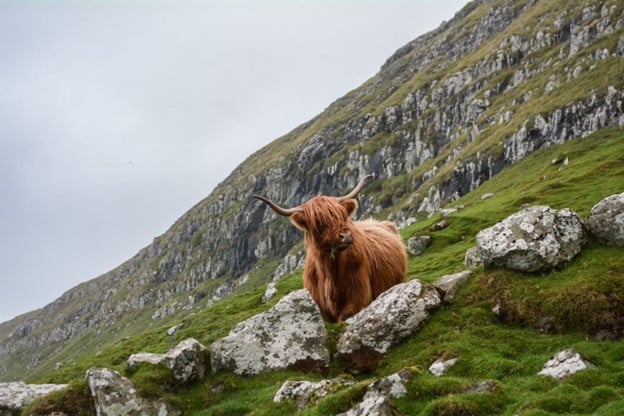A winter motorhome holiday allows you to fully immerse yourself in Scotland’s beauty. Scotland becomes a true winter paradise, with snow-capped Highlands, frost-dusted lochs, and snow-covered villages. Making proper plans for the winter driving conditions and freezing temperatures can guarantee a comfortable and enjoyable motorhome holiday.
Clothing essentials
Clothing is very important, especially If you are going to a place where the temperature drops and it gets very cold. You should be sure to pack plenty of insulating, thermal layers which will be essential for both outdoor adventures and cosy nights inside the campervan as it can get pretty cold.
Flannel shirts, wool sweaters, fleece pullovers, and down or puffer vests also provide extra insulation without the bulk of heavy coats when inside. Brands like The North Face, Patagonia, or Mammut make gear made to block wind, seal out moisture, and contain body heat. You should consider additional things like removable bibs, and skirt/hand gaiters to prevent snow entering boots or gloves.
A hood, helmet, balaclava, hats, and gloves should also be considered when packing for full coverage when exploring Scotland’s snowy, icy trails or even simply stargazing at night.
No winter packing list would be complete without warm socks and footwear built for trudging through snow, which can be very bad sometimes. As for snow boots or winter hiking shoes, look for waterproof materials with rigid soles and adequate ankle support from brands like Sorel, Salomon, or Helly Hansen. For serious winter treks, full-on mountaineering boots may be required as they will be safer when hiking the Scottish landscape.
Motorhome accessories
To start you on your driving adventure around the country, make a search using “luxury motorhome hire Scotland” to locate the perfect vehicle for you. You’ll want to make sure you have everything you need so you’re not caught short on the road. Small portable propane or electric heaters are essential for warming up a cold motorhome first thing in the morning or late at night.
Brands like Camco Olympian Wave heaters attach directly to propane tanks and radiate heat in all directions quickly thanks to the built-in fan. A small indoor safe electric heater can also provide ambient warmth in the main cabin area day or night.
Investing in a compact yet powerful portable generator lets you run electric appliances and charge devices if not hooked up to power mains overnight. You should equip your motorhome kitchen with reliable, durable cookware that performs well on both camp stoves and open fires for flexibility. Stainless steel pots and pans by companies like Coleman hold up better in harsh winter temps compared to other metals.
Don’t forget key utensils, cutlery, cups, plates, knives, and of course insulated thermos, these can come in very handy when living in a motorhome. Pitching a tent beside the campervan gives you extra sheltered space to cook, sleep, or store gear in. Think about multi-room layouts that include an entryway for storing equipment or changing dirty boots without having to go inside.
Winter safety equipment
When road-tripping through Scotland’s remote, snow-covered regions in a motorhome during winter, bringing some key safety accessories can provide peace of mind and prepare you for harsh conditions. Snow chains worn over the tires of the vehicle provide critical traction and braking capability when roads become snowy or icy. Cable-style chains tend to be easiest to mount on most vehicles. Practice installing them at home so you’re ready to chain up quickly as needed.
A shovel in good condition should come standard for winter vehicles as you may encounter heavy snow that requires digging out parking spots, freeing stuck tires, clearing entrance steps, or even digging pathways. There are lightweight but robust shovels that quickly extend to full size and would also be a great asset to your holiday when there is a chance of heavy snow. Keep your motorhome’s door jambs, handles, and locks ice-free with de-icer sprays containing glycerine which help melt ice fast down to frigid – 7 Celsius (-45 degrees Fahrenheit) or lower temperatures common in the Scottish Highlands.
The worst can always happen, so it is always best to be prepared. In every motorhome, you should carry an emergency kit complete with road flares, a torch, first aid supplies, an external phone battery charger, a fire starter, and a printed map of Scotland in case GPS fails in remote areas. Additionally, store key phone numbers including roadside assistance and emergency contacts so that if the worst comes, you are prepared and will be safe.
Conclusion
There is no better way to experience the Scottish highlands and islands than with a motorhome. You get every experience you could want: the rustic camping tent packed, the luxury B&Bs, spas, and golf resorts at each stop, and the amazing feeling of doing a road trip in comfort.
Main image source: Unsplash





